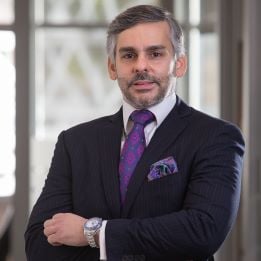

Legal director | InterEnergy Group (Dominican Republic)



Marcos Ortega Fernández
Legal director | InterEnergy Group (Dominican Republic)
Team size: 11
How do you approach managing legal aspects during periods of instability or crises, and how does your legal strategy align with the broader business strategy to ensure the organisation’s resilience?
As general counsel of InterEnergy Group in the Dominican Republic, it is our responsibility to identify potential contingencies that could develop into crises. This requires critical thinking and analysis to anticipate situations that could negatively impact the organisation and to address the associated challenges. The legal strategy should always align with the organisation’s operational areas and objectives. Communication, coordination, and planning are key elements in mitigating the potential negative impact that could arise during periods of instability. As part of the board of directors and management team, it is our duty to design the most suitable strategy to guide the organisation through any crisis and ensure the best possible recovery.
What are the main cases or transactions you have been involved in recently?
The CEPM Zero initiative, aimed at decarbonising the CEPM’s concession area, which supplies over 65% of hotel rooms in the Dominican Republic. The objective is to establish over 600 MW in renewable energy projects, such as wind, solar, hydrogen, pump hydro, and BESS, by 2030. Oversight of loan agreements exceeding US$200m with both international and local banks.
The management of Gas Supply Agreement transactions, including: successful negotiation of EPC and TSA, and acquisition of all necessary permits for wind farm projects; Oversight of collaboration agreements between the automotive industry and electric vehicle infrastructure operators to promote electric mobility in Latin America; Leading the obtention of the necessary licenses and permits from the relevant authorities for project development; taking an ctive role in ensuring strict adherence to regulations and guidelines, such as technical standards, safety measures, and environmental regulations; and leading major litigation across a diverse range of cases.
What measures has your company taken to embed sustainability practices into its core business operations, and how does the role of the general counsel contribute to driving and ensuring sustainable practices within the company?
InterEnergy Group -including affiliates and subsidiaries- has taken significant measures to embed sustainability practices into its core business operations, focusing on compliance with Paris Agreement targets, decarbonisation projects, and advances in electric mobility. We are committed to reducing our carbon footprint through renewable energy initiatives, energy efficiency improvements, and the development of green infrastructure. Specifically, our CEPM Zero initiative which includes transitioning to cleaner energy sources and investing in technologies that minimise emissions by 2030 (for CEPM) and 2050 for all InterEnergy Group. Additionally, EVERGO (our EV chargers’ company) plays a crucial role in promoting electric mobility by expanding the network of electric vehicle charging stations, thereby encouraging the adoption of cleaner transportation options.
As head of legal, the role is integral to driving and ensuring sustainable practices within the company. I oversee compliance with environmental regulations, integrate sustainability goals into corporate policies, and advise on legal risks associated with sustainability initiatives. By ensuring that all our projects and operations align with our sustainability objectives, we contribute to position our company as a leader in the transition to a more sustainable future.
What emerging technologies do you see as having the most significant impact on the legal profession in the near future, and how do you stay updated on these developments?
Implementing software that automates internal processes is crucial for reducing time spent on administrative tasks and managing the complete cycle of requesting, reviewing, and executing agreements in a consolidated workspace. This allows the organisation to maintain a comprehensive overview of ongoing negotiations and provides valuable information and metrics for data management and decision-making processes after agreements are executed. Additionally, artificial intelligence developments, when used under appropriate parameters, can play a significant role in risk assessment and in drafting and reviewing legal documents within the framework of any given transaction.
Director Legal | Consorcio Energético Punta Cana Macao (CEPM)